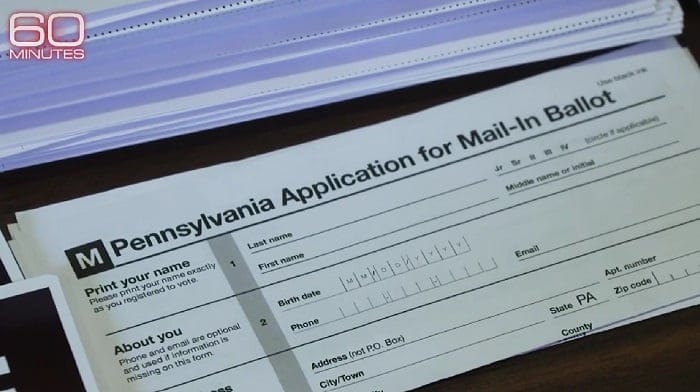
A Pennsylvania court ruled Friday that the critical battleground state’s mail-in voting law is unconstitutional.
The law, known as Act 77, permitted no-excuse absentee voting, created a permanent mail-in voter list, and reduced the voter registration deadline from 30 days to 15.
Three Republican judges sided with the GOP challengers in the case while two Democrat judges on the panel dissented.
The ruling indicates that the state Constitution requires voters to cast ballots in person unless they meet specific requirements.
NEW: A Republican-led Pennsylvania court has ruled that the state’s no-excuse mail-in voting law is unconstitutional https://t.co/lIrsa5Hys8
— Axios (@axios) January 28, 2022
The opinion, written by Judge Mary Hannah Leavitt, leaves the door open for proponents of no-excuse mail-in voting to adopt a Constitutional amendment.
“If presented to the people, a constitutional amendment to end the Article VII, Section 1 requirement of in-person voting is likely to be adopted,” writes Leavitt.
“But a constitutional amendment must be presented to the people and adopted into our fundamental law before legislation authorizing no-excuse mail-in voting can ‘be placed upon our statute books.'”
The Pennsylvania state legislature passed Act 77 in 2019 with bipartisan support. It allowed no-excuse mail voting for all voters.
Court ruling puts mail-in voting on hold in Pennsylvania under the commonwealth’s constitution — further confirming the unconstitutionality of PA’s mass vote by mail system used for 2020 election. https://t.co/XB9k5yXU3h via @fox43
— Tom Fitton (@TomFitton) January 28, 2022
RELATED: Clarence Thomas: ‘Citizens Deserve Better’ Than Supreme Court Refusing To Hear PA Election Case
Pennsylvania Mail-In Voting Unconstitutional
The celebration will likely be short-lived as Democrats are pledging to appeal the ruling to the state Supreme Court.
“This is just a continuation of attacking and undermining our electoral process,” said State Senator Jay Costa, the Democratic minority leader.
The New York Times notes that the Pennsylvania Supreme Court “has sided with the state on voting issues both during and following the 2020 election.”
An appeal will trigger an automatic stay of the decision and leave Act 77 in place while the high court considers the case.
Do tell. Changing election procedures willy-nilly actually is unconstitutional. Imagine my surprise: #Pennsylvania #MailInVoting https://t.co/KsR7dwcnng
— Mark Davis (@MarkDavis) January 28, 2022
RELATED: Report: Democrat Candidates Are Hidin’ From Biden As Poll Numbers Continue To Crater
Democrats Will Appeal
The Supreme Court this past February refused to hear a challenge to Pennsylvania mail-in voting procedures that permitted ballots to be counted up to three days after Election Day.
Supreme Court Justice Clarence Thomas, writing in his dissent, claimed the institution invited an “erosion of voter confidence” by not addressing the situation.
“The decision to leave election law hidden beneath a shroud of doubt is baffling,” he wrote. “By doing nothing, we invite further confusion and erosion of voter confidence. Our fellow citizens deserve better and expect more of us.”
Clarence Thomas with the verbal smackdown pic.twitter.com/wm2NdurwBi
— Release The Poso (@JackPosobiec) February 22, 2021
Justice Thomas proceeded to state that the lack of evidence of widespread voter fraud in elections is of “only small comfort.”
“An election free from strong evidence of systemic fraud is not alone sufficient for election confidence,” he continued.
Thomas’ concerns were less related to the 2020 election and more to with future elections.
He was referencing the fact that the refusal by the Supreme Court to hear the case – something he called “inexplicable” – would cause problems in future elections.
Fast forward to today, where Democrats now argue that changes to mail-in voting could make elections illegitimate in the future.
This second attempt from Biden on whether the election will be legit is even worse.
“Oh, yeah, I think it could easily be illegitimate … The increase in the prospect of being illegitimate is in proportion to not being able to get these reforms passed.” pic.twitter.com/nCyuAWSMXm
— Justin Baragona (@justinbaragona) January 19, 2022
Biden, when questioned by a reporter as to whether or not the President felt we would have free and fair elections in 2022, planted the conspiracy seeds.
“Oh, yeah,” he replied. “I think it easily could be illegitimate.”
The Political Insider reported earlier this week that several Senate Democrats are contemplating pushing a narrative that the 2022 midterm elections are illegitimate due to Republican opposition to passing their national voting bill.
Democrat legislation being pushed would expand mail-in voting, grant federal control to elections, and require less restrictive voter ID laws.
